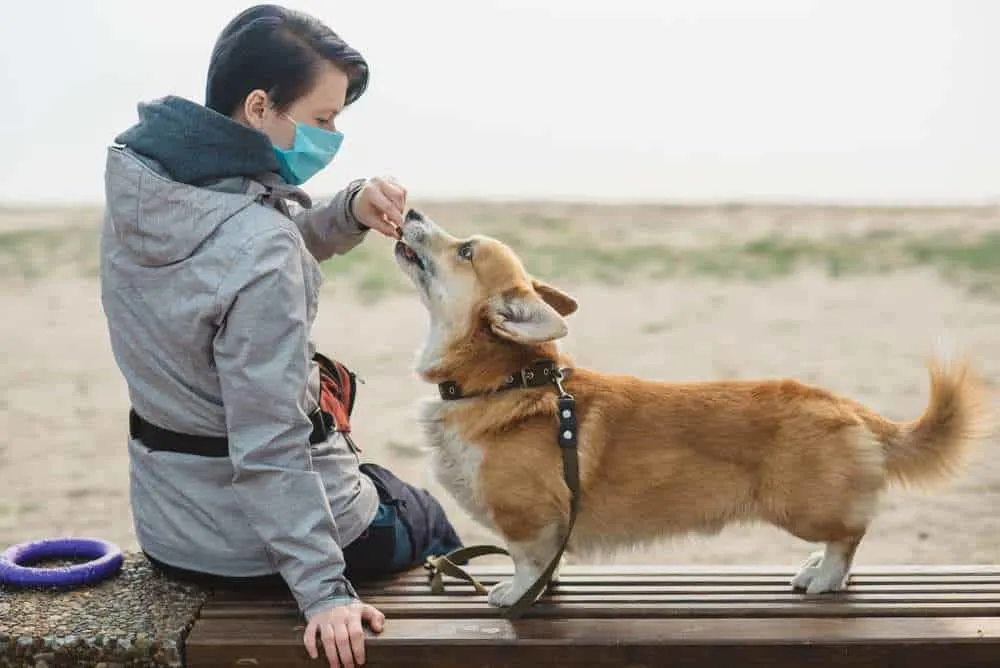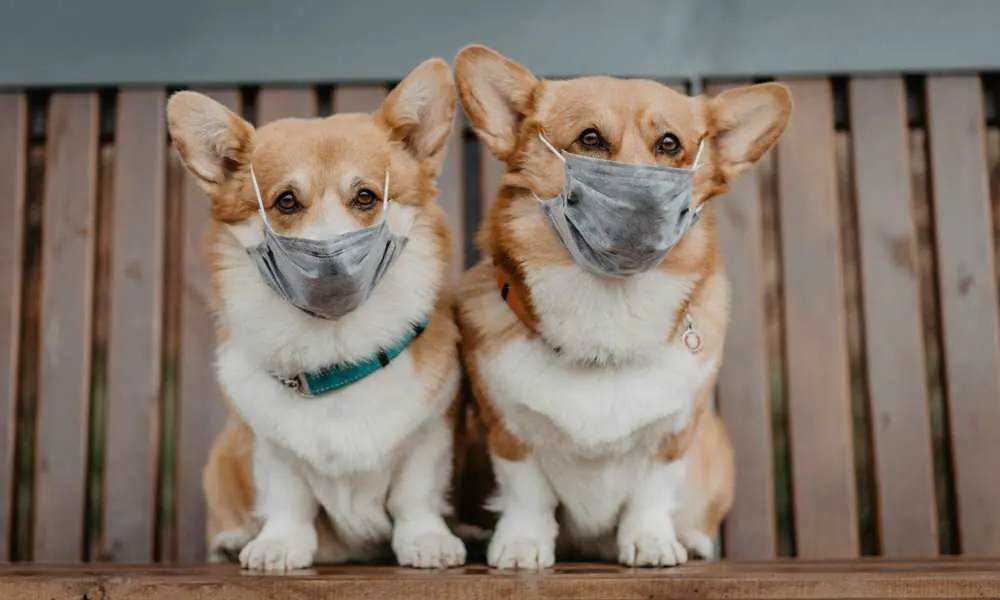Medical care of your dog, no matter the breed, simply can’t be stressed enough. Whether you have just bought your corgi, adopted it, or had him for a long time – you shouldn’t get used to skipping the vet’s appointments.
Nowadays, with advanced technology and medical tests, you can find a lot about your corgi. When they reach a certain age, one of the most common questions raised when you visit the vet is – Are corgis hypoallergenic? Just as we humans have a lot of trouble with our spring allergies, our dogs also suffer, especially if we ignore this issue.
If you are concerned about your corgi’s allergies and other possible health threats, we advise you to continue reading this article, and we will try our best to answer all of your questions.

Can Corgis Be Hypoallergenic?
You are surely aware of many dog breeds that shed excessively and cause allergies. Since you are an owner of a corgi, you have surely wondered – Can corgis be hypoallergenic?
If you have been searching for the answer to this question, then you should visit the AKC website.
American Kennel Club is a famous canine organization that specializes in every type of disease and treatment your dog might need.
Lucky for you, according to the recent research by AKC, neither the Welsh Cardigan Corgi nor the Pembroke Welsh Corgi is not hypoallergenic.
After a long time of asking – are corgis allergy friendly – the answer is yes, but not 100%.

Hypoallergenic – Explained
If this is your first time owning a dog, a Welsh Corgi, in this case, you are most likely not familiar with the long medical terms that your vet throws at you. Let us explain this one.
What does it mean to be hypoallergenic? How hypoallergenic are corgis?
First – the “hypo” part. This is Greek, and it means under or beneath. So, how does it mix with the term allergies, and what does it have to do with dogs?
A hypoallergenic dog is a dog that doesn’t show a reaction vividly. There has been a theory going around that a hypoallergenic dog does not shed, and therefore doesn’t spread allergen. When people heard this, they were quick to ask – are corgis OK for allergies?
Although this has never been scientifically proven, it doesn’t mean that your dog is 100% allergy-free.
The number of house pets (both cats and dogs) has blasted in the past 50 years, and people are taking all the necessary measures to live peacefully for them and their pets.
In 2012, in the Netherlands and Virginia, a group of scientists had conducted research on hypoallergenic breeds, and the main concern was to find out if such a dog really sheds less?
Here’s how it went down.
Dog hair and the coat were collected and analyzed for Can f one concentration. This is simply the level of allergies a dog contains over his lifespan. It turns out that on the top of the list of hypoallergenic dogs were poodles, Labradoodles, and Spanish water dogs – all of them with rich coats and hair.
Allergies of all kinds appear after the dog has passed six months, so if you want to find out everything about allergies in corgis, wait for a little for your pup to grow and then pop the question.

Top 5 Hypoallergenic Dog Breeds
Although corgis are not on the hypoallergenic list, that doesn’t exclude some other famous breeds you might have in your neighborhood – you might not have known that this particular breed will find its place here.
So, take a good look.
1. The Poodle
- As you might have guessed it, the famous poodle is on the top of the list, and how could it not be with all that fur going on? For the record, the large standard poodle is the most hypoallergenic. Since they are at the top of the list, they will need some professional grooming.
2. Bichon Frise
- This small lap dog might not be as active as your corgi, but it is still an ideal pet. However, you ought to be careful with this one. If you are suffering from some kind of allergy, bear in mind that the bichon frise needs constant brushing, and you can find yourself in a situation where you can’t stop sneezing. If this is the case – hand him over to a non-allergic family member.
3. Italian Greyhound
- This one is a little bit different from the previous two. He is not that energetic and friendly and certainly doesn’t need a lot of grooming. What’s his deal then? He is most likely to bond with only one family member and maybe one dog in your household. The thing is – the Italian greyhound doesn’t have a lot of doggy odor.
4. Portuguese Water Dog
- We can say with certainty that this might be one of the best choices for an allergic person. Apart from the fact that this is a water-loving pup and it doesn’t shed so much, you should definitely own one. Although it sheds rarely, it would still be good to include some professional grooming from time to time.
5. Chihuahua
- Bet you didn’t expect this breed to be on the list? Neither did we, but here it is. This intelligent and energetic breed has earned its place on the list thanks to its single coat and a tiny frame. Good luck with this one running around the house 24/7!

Bad Or Good For Allergies?
So far, we have concluded that a hypoallergenic dog is a good dog because he sheds rarely and doesn’t produce that much dog allergen. We have listed poodles, Labradoodles, but what about corgis?
We all know both Cardigan and Pembroke corgi to be a cheerful and friendly breed – meaning they will require your constant attention and energy.
Concerned owners come to the vet and the most common questions asked are:
Are corgis good for allergies? and Are corgis bad for allergies?
Let’s clear this once and for all. People who deal with severe allergies should not be thinking of bringing a corgi into their home – primarily for health reasons.
This breed is one second in the living room and running in the backyard in the other. They are also a bit clumsy and have a fluffy fur, and fur coming off means allergen spreading.
Not good, especially if your kids have some allergies as well.
Corgi dogs shed – and a lot!
Since they were herd dogs, this meant that they spent a lot of time outside. And since they were in nature during winter, they developed a heavy coat, which helped them adjust to any season.
They have a thing called – seasonal shedding. This means that your corgi sheds as seasons go by, especially in the spring. And we all know that spring is the allergy season.
So, what now? Are corgis prone to allergies?
Possibly.
But you can manage this shedding and fix it to your advantage. You can do this in 5 ways:
- Regular brushing – they need regular brushing but don’t worry, they are not a big dog. You can take care of this in 15 minutes max. This will tremendously help promote healthy skin and a new coat.
- Healthy eating – just like humans, dogs need a healthy diet as well. With the necessary nutrients and vitamins, your corgi’s skin and coat will be in perfect shape, and you won’t have to worry about all that excessive shedding.
- Regular bath-time – if you are a responsible and cautious owner, you will make it a priority to bathe your dog once a week. This will contribute to removing all of the dead skin and hair. But be careful with water – don’t make it too hot, your corgi’s skin can be very sensitive – you should treat him like a baby!
- Regular visits to the vet – it is essential that you take your dog to the vet for regular check-ups, and this refers to every dog – not just a corgi. They could be having problems with their skin and coat, and you wouldn’t have the slightest idea!
- Regular grooming – you have read that poodles need professional grooming, so you might be thinking if this refers to corgis as well? No, don’t worry about that. Poodles have peculiar hair and coats, and they need some extra attention. Your corgi has a simple coat, and you can easily groom it by yourself – just be sure to do it regularly.

Disease And Dander
By now, you have concluded that a corgi dog is a sensitive dog – he needs constant nurturing and care. And if you truly love your pet, you should be familiar with the specifics.
Apart from not being hypoallergenic, they are not the healthiest breed either. Corgis suffer from numerous diseases, some inherited and some not.
Here are the most common health problems your corgi will deal with during his lifetime.
Corgi Health Problems
| Cutaneous asthenia | This is a dog disease characterized by the tissue in the skin becoming more fragile and sensitive. It can lead to excessive surface bruising or even blood blisters. |
| Cystinuria | A protein called cysteine extends in the dog’s urine and causes stones to form. This can be incredibly painful for the dog, and you should seek help immediately. |
| Obesity | There is no secret in that some owners like their corgis chubby, so they feed them more than enough. This is not a good idea at all – why? Corgis are small dogs with small legs that are simply not built for carrying all that weight. |
| Epilepsy | Canine epilepsy is undoubtedly something that worries every owner. Unfortunately, this something that is inherited, and there is no definite cure. The long-term prognosis is not so bad, but it gets harder to cope with after some time – your dog might become very clumsy and hurt himself. |
| Intervertebral disc disease | This is a disease that affects the disc between the vertebrae bulges in the spinal cord. This is very painful, and in the worst case scenario, your corgi might end up paralyzed. It is important to notice it in time and save your dog the pain. |
| Degenerative myelopathy (DM) | Just like the previous one, this one also occurs in the spinal cord of your corgi, and it can lead to paralysis of hind limbs. You will notice it if your corgi shows laziness and difficulty to move – all of which are not characteristics for this breed. |
| Hip dysplasia | This is not common just for corgis. All small-sized dogs tend to suffer from this because their bodies have a particular shape. Hip dysplasia with corgis is dangerous because it can have a rapid growth if not noticed in time. The symptoms are similar to canine arthritis. |
| Eye conditions | Unfortunately, corgis can have some severe eye problems, which can damage their sight and lead to partial blindness. These diseases come by the names of cataracts, progressive retinal atrophy, or retinal dysplasia. Either way, if you notice that your corgi is continually bumping into things, better head to the vet! |
| Von Willebrands Disease | Unlike the other, this is a blood disease, and this is common for both dogs and humans. If your dog suffers from this, you will notice blood coming from their nose or a bloody stool. In any case, take him to the vet and do a DNA test to be sure. Better safe than sorry! |
That was a pretty long list of diseases, and now it’s time to move to the next category, which is dander. What is this, and do corgis have dander?
Buckle-up, it’s time to find out just how bad are corgis for allergies.
First, let’s make one thing clear – what is dander? This is just another term for dog allergies: small particles that have shed from your pet.
Do corgis have a lot of dander? Yes, indeed. We have already mentioned that they “shed” seasonally, which can cause many problems in the household.
The moment you notice excessive:
- Coughing
- Sneezing
- Wheezing
- Stuffy or runny nose
- Eczema
You are dealing with corgi dander – a lot of it.
But how does it come to this? How does this spread? Easy.
These small hairs that your dog doesn’t need any more are so small that they are practically invisible. But that is not the worst part – they end up everywhere, and we mean everywhere from clothes to your hair, objects, furniture, glasses, etc. You can carry them with you and not even know.
Luckily, there are ways in which you can treat this invisible enemy.
Corgi Dander Solutions
| Allergen avoidance | There is a way in which you can avoid catching dog allergens – by antihistamines and medications. Our best advice is to keep your pet out of your private rooms, like the bedroom and bathroom. Most dander is found on the human bed and in the bathtub. |
| Air purifiers | These gadgets not only eliminate allergens, but they also contribute to getting rid of any other pollutant that is in your home. They also refresh your household. There are many different designs with different volumes and strengths according to your home. |
| HEPA vacuum cleaners | Another thing that helps fight allergies is the HEPA vacuum cleaner. This helps destroy even the smallest dander on the floor. You can also purchase a vacuum for your laundry – also very helpful for large families with more than one corgi. |
| Immunotherapy | This includes the owner getting injections that protect him from pet dander. This is good in the long-run, but there are two downsides to this – they don’t work for everyone, and they are costly. |
So, to answer your question:
Do corgis cause allergies in humans? Yes. If you have been sneezing or coughing without any evident reason, turn to your pet for some answers.

Allergy Carriers
If you think that pollen is the one and only carrier of allergy, you are wrong. Your dog is actually the one who will bring all these allergens into your home.
They shed a lot and change fur seasonally, but do corgis trigger allergies in people?
Indeed they do. But they are not the worst ones. Many more dogs are thicker and demanding fur that is almost the breeder of allergies, and we are here to list them down.
Here are the top 8 allergy carriers:
- Basset hound – these loveable and cute puppies will surely win you over with their attractive shape and wiggly tail, but the problem is in their saliva. Who knows what they pick up before they come and lick you – so you ought to be careful with this. They also shed a lot, but the highlight is on their mouth.
- Doberman Pinscher – this loyal protector might not be able to protect you from allergies. Unlike some other breeds, a Doberman is prone to skin problems, which results in different allergies piling up.
- German Shepherd – this is one of the most popular breeds out there, but also a one that sheds excessively. Their hair can end up everywhere, and that’s where the problem lies. A German Shepherd is bound to cause some allergic reactions sooner or later.
- Siberian Husky – just like shepherds, huskies are also popular and full of hair, and they dispose of a lot of it during the season.
- Labrador retriever – although this is considered to be an ideal family pet, it sheds a lot, and if you have some allergic family members – you should think twice. A Labrador has an excessive amount of allergen in his coat.
- Pekingese – this small-size needs two things: grooming and training. Both can be a problem if not handled in time. They have a lot of hair, and if you don’t teach them some basic commands, it can end up everywhere in the house.
- Saint Bernard – this may be viewed as a giant pet, but a Bernard is a gentle soul, especially among kids. So, it would be best to check your kids’ allergies since they will be spending a lot of time together.
- Pug – you will be surprised to see this breed listed here, but the coat of a pug sheds all year long, and they need constant care and grooming. Don’t be fooled by the look!

How To Spot An Allergic Owner
There are many cases where people don’t know that they are allergic to their dog until they actually get one. You can be allergic to food, pollen, but you can also be allergic to your dog.
So, do corgis cause allergies?
Let’s see.
An allergic dog owner will have some of the following symptoms:
- Swelling and itching in the nose and around the eyes.
- Redness spread throughout the skin.
- Coughing, shortness of breath.
- Various rashes on the face, neck, or chest.
People who have asthma may have a severe asthma attack, and this could be very dangerous.
So, if you have had these problems recently, your corgi most likely caused them.
However, there are a lot of ways in which you can help yourself. You can choose between medication and natural processes.
As for medication, nasal corticosteroids, cromolyn sodium, and allergy shots may be of help. On the other hand, pre-testing for allergies and taking better care of your dog’s appearance and health all fit in the natural process category.
Good luck!

Conclusion
When it comes to dog care, many owners wonder whether their dog is hypoallergenic or not.
First, we should clarify what does it mean to be “hypoallergenic”? This simply means that your dog doesn’t have a strong reaction to allergies and doesn’t shed. A corgi – no matter the breed – is not hypoallergenic. So, if you are a person who suffers from allergic reactions, you are not safe around these dogs.
Unlike corgis, there are breeds which don’t shed a lot and they are safe around allergic people. On that list, you can find the poodle, the bichon frise and the italian greyhound. They don’t shed a lot during seasons, which means that they don’t leave a lot of dog allergen around. Dog allergen or dander are small particles in dog hair that end up everywhere.
If you have a corgi, you can manage the spreading of dog allergen by taking them to the vet regularly, doing some grooming from time to time and giving them a good bath.
There are also other pet dander solutions such as air purifiers, HEPA vacuum cleaners and immunotherapy.
Some of the most famous allergy carriers among dogs are the basset hound, doberman, and german shepherd. If you are around these breeds, and you notice some swelling and various rashes on your skin, then you are probably allergic and you should visit the doctor immediately.

